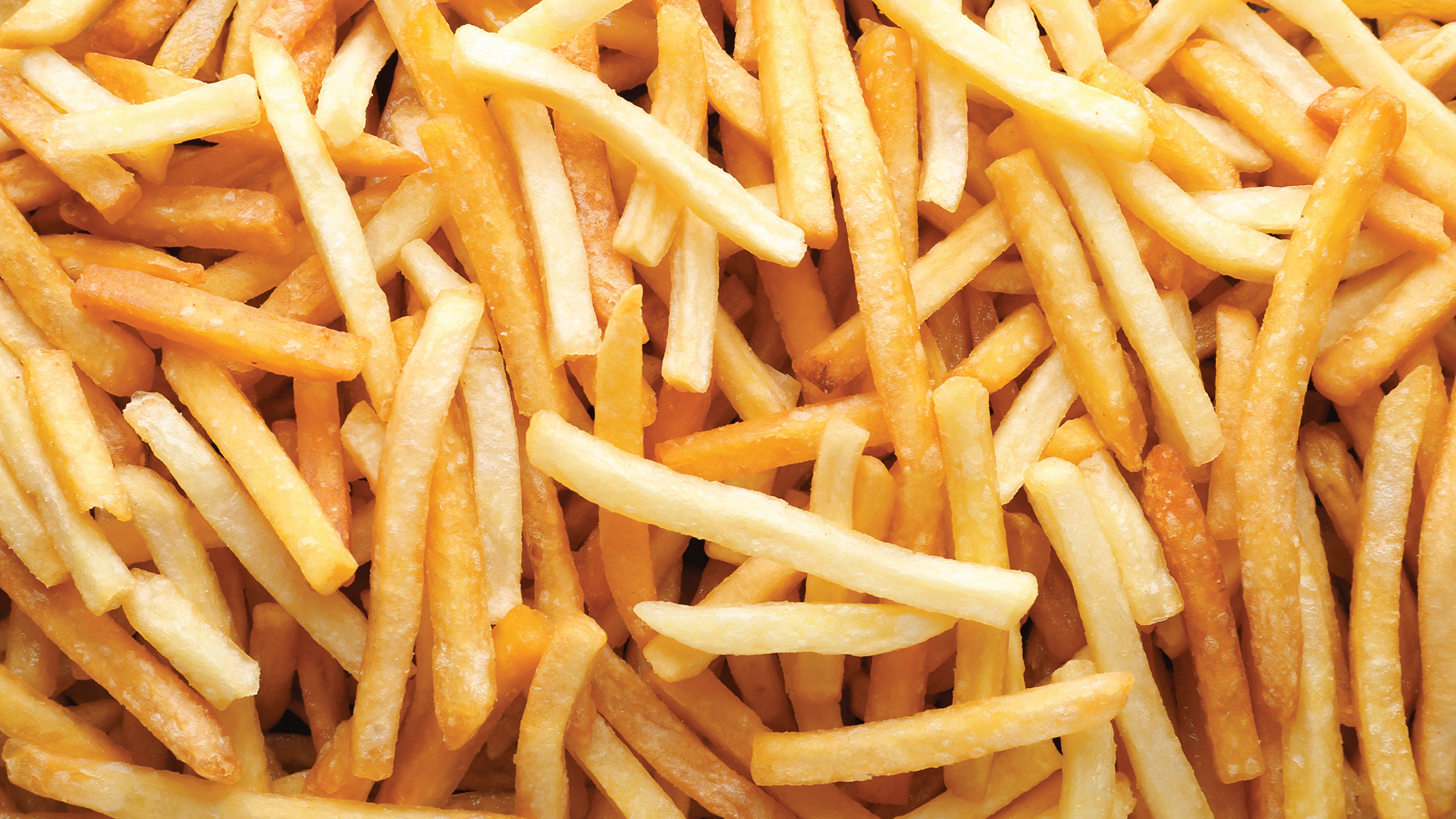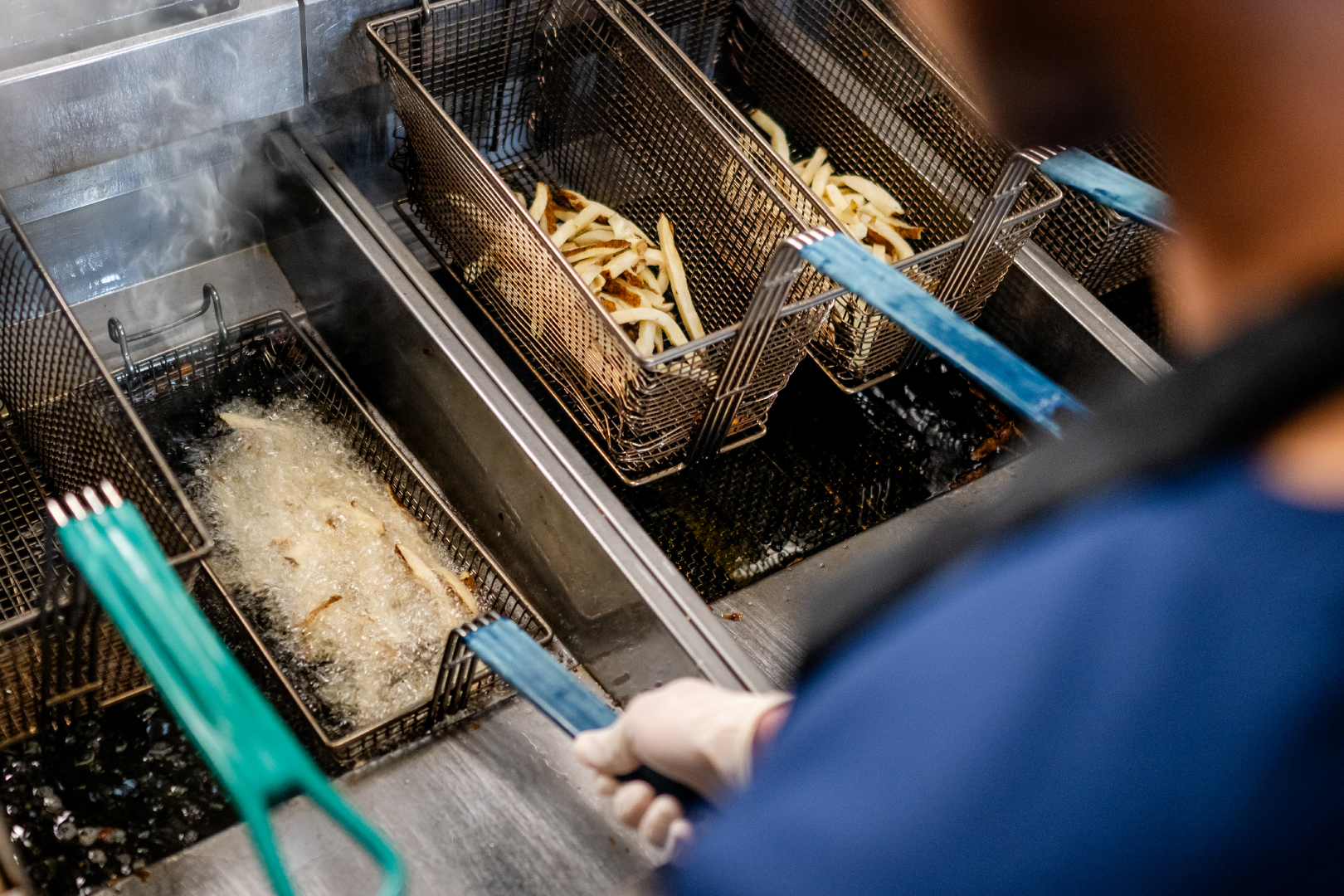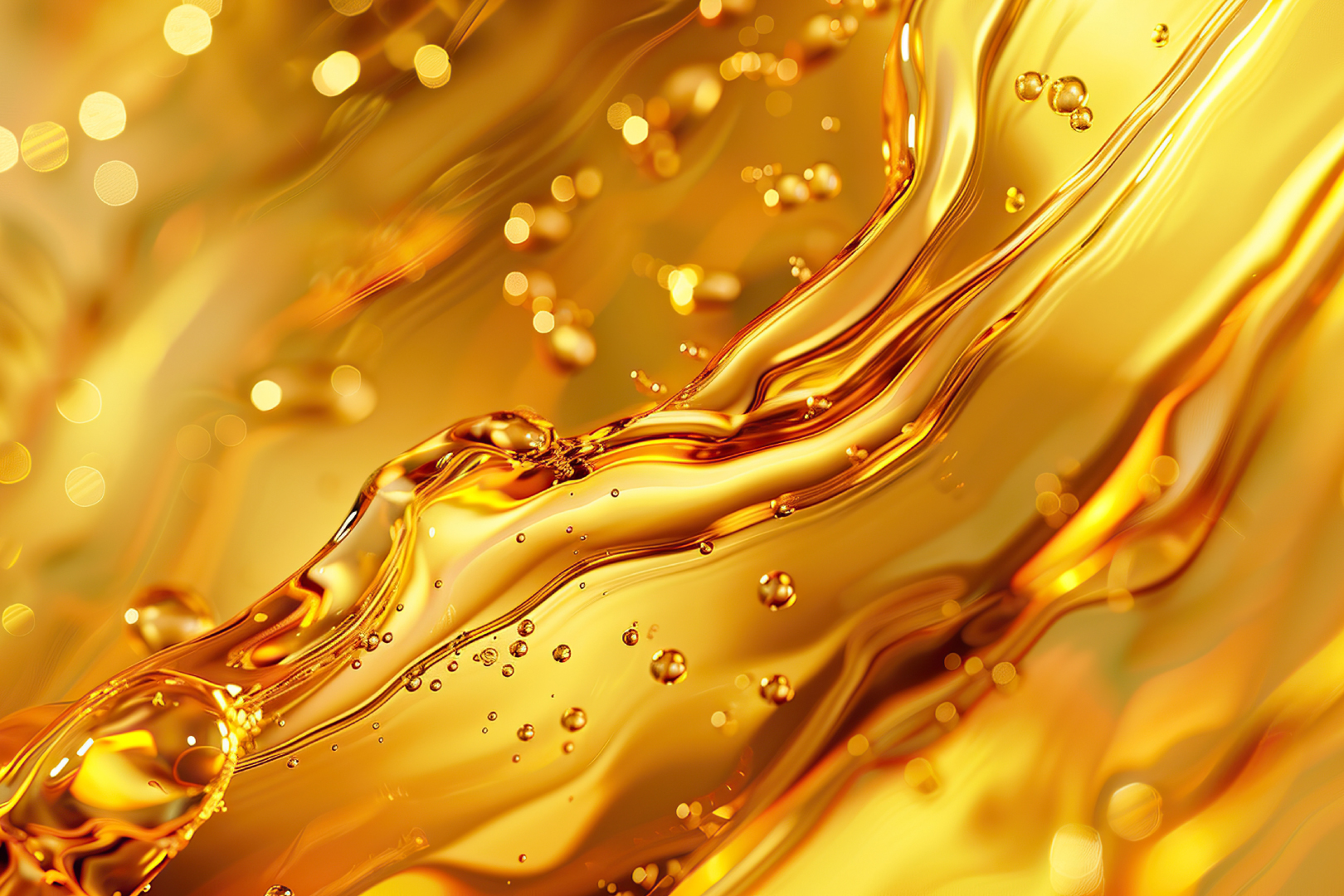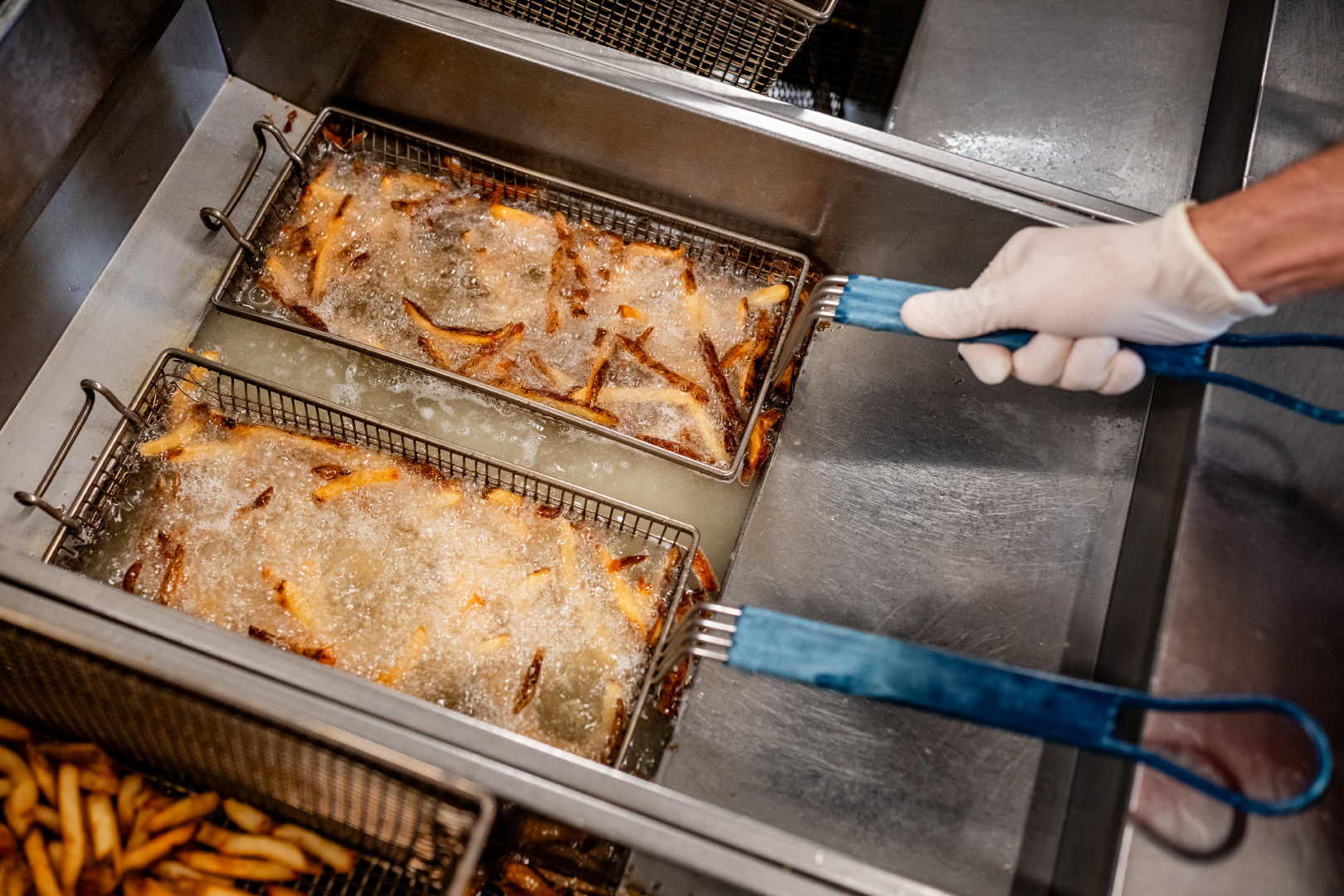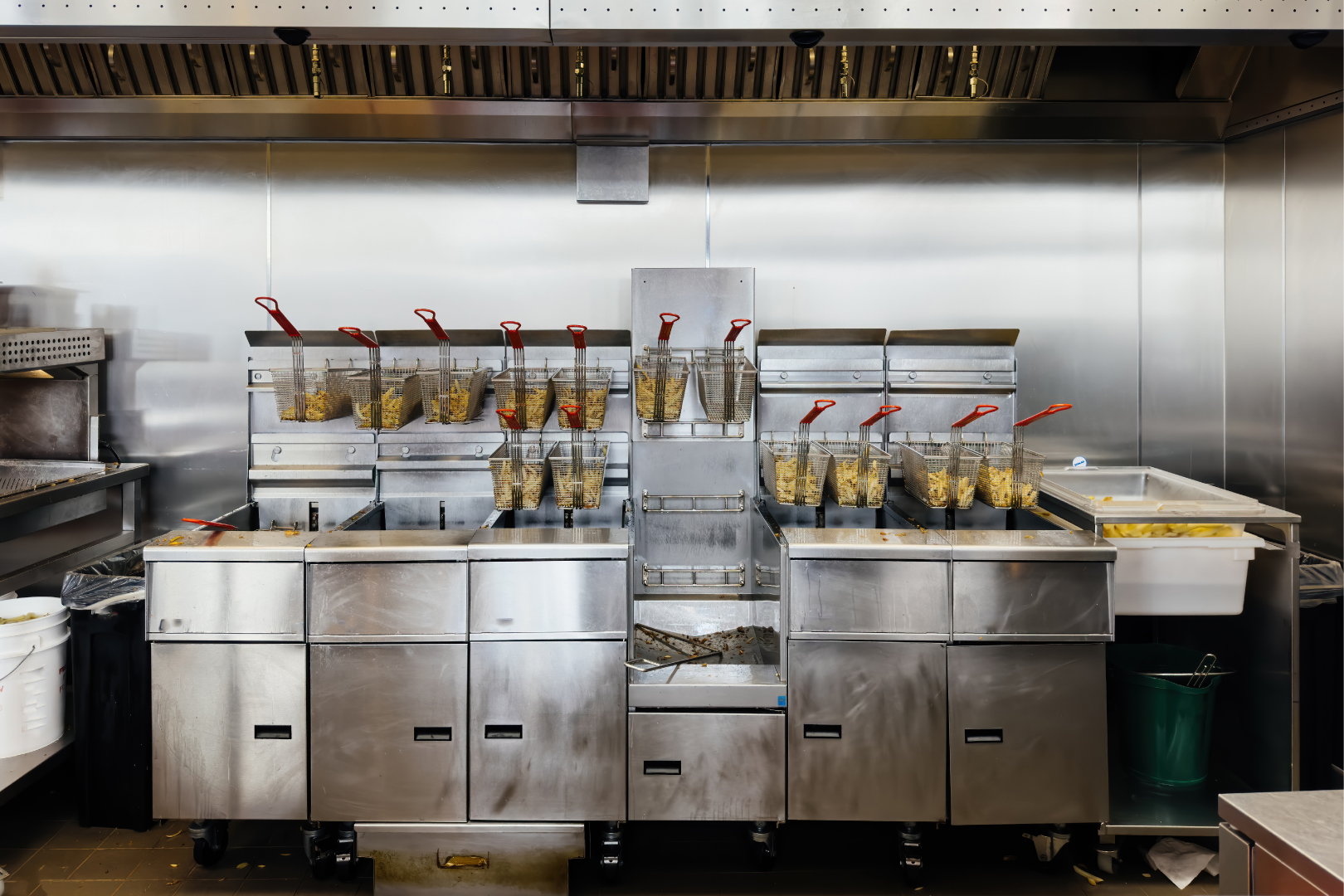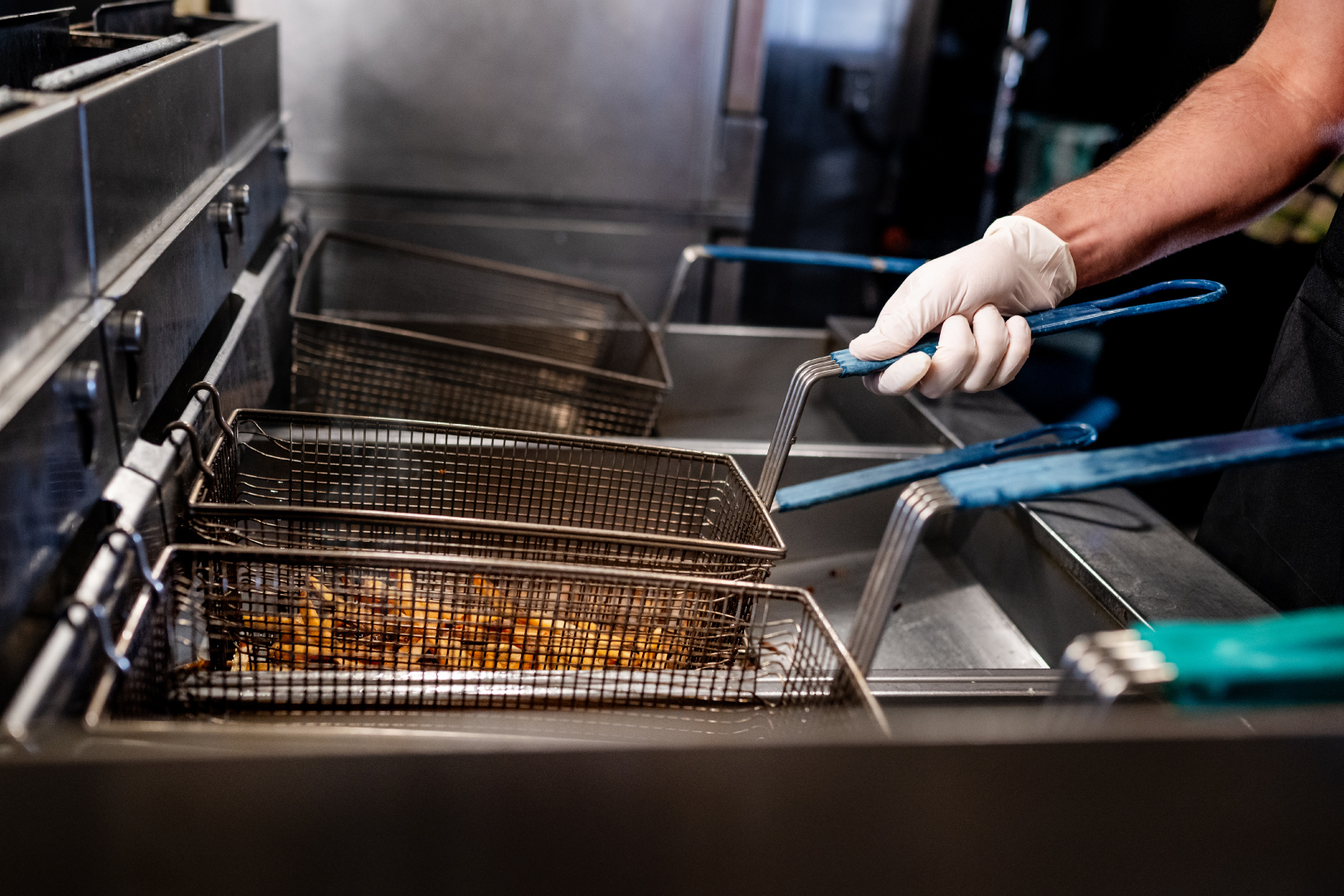What Causes Cooking Oil to Break Down?
Several things can accelerate the breakdown of oil in a deep fryer, reducing its quality and shortening its cooking life. Educating your staff on these six “enemies of cooking oil” can go a long way toward cooking consistently delicious fried foods.
- Heat: As you cook with oil, continued exposure to heat will cause it to break down. It might make sense for you to turn off your fryers when you’re not using them.
- Water: Not only does water cause oil to smoke and splatter, the hydrogen contained in water also initiates hydrolysis, the first major chemical reaction that oil undergoes as it cooks food.
- Oxygen: Oxygen accelerates oxidation, one of the chemical reactions that degrades the quality of cooking oil and negatively impacts flavor. With oxygen in the air, and in the food you’re cooking, there’s no way to prevent exposing oil to oxygen, but you can try to limit excessive exposure. Splashing food into oil injects oxygen, so avoid dropping food in and instead set it in gently.
- Carbon buildup: Bits of food, breading, or batter break off during the deep frying process. Remove these as soon as possible through skimming or filtering. The longer they remain in the oil, the more they will accelerate breakdown.
- Salt and seasonings: Salt and other seasonings accelerate oil breakdown by increasing the oxidation of fatty acids.
- Soap: Emulsifiers like soap bring oil and water together and catalyze the breakdown of oil through hydrolysis. Soap also gives oil a bitter alkaline taste.
Heat Control: The Key to Making Cooking Oil Last
Consistent heat control is one of the most effective ways to maximize cooking oil life. Cooking oil exposed to high temperatures for extended periods breaks down faster, even when no food is being prepared. Allowing oil to remain hot when fryers are idle accelerates compound formation that shortens usable life and increases the likelihood that oil is no longer suitable for cooking.
Managing heat intentionally helps oil last as long as possible. Lowering temperatures during slow periods, avoiding unnecessary reheating cycles, and selecting oil with a high smoke point all significantly slow degradation. When oil is held at the right temperature, it remains cleaner, more stable, and better able to deliver consistent results for foods like French fries, breaded items, or fish without premature spoilage.
Save on Your Insurance Premiums.
Automate your cooking oil management to improve safety, efficiency, and food quality.
Deep Fryer Oil Best Practices to Extend Cooking Life
Are you familiar with these fryer oil best practices? Here are six things every kitchen with a deep fryer should be doing:
- Filter oil at least twice a day: Proper filtration is the most important step in extending the life of your fryer oil. It helps control consistency and keeps operational costs down.
- Skim every 15 minutes: Start by skimming the top and sides of the fryer with a skimmer, and dispose of any particles. Removing loose food particles helps keep your oil cleaner for longer, improves food quality consistency, and maintains the unique flavor profile of your food.
- Establish a schedule for turning off vats: Shutting off the fryer when it’s not in use is an efficient and sustainable way to extend the life of your oil. This also helps conserve energy.
- Cover fryers when not in use: Covering your fryer decreases the likelihood of contamination from substances and particles not intended for the fryer.
- Check fryer calibration on a quarterly basis: Fryer systems tend to require recalibration over time. Compare the temperature of your fryer to the temperature reading on a food thermometer placed in hot oil. Adjust your fryer’s temperature accordingly. If your oil is hotter than you think it is, it will degrade more quickly.
- Fill fryer only to the appropriate oil levels: Avoid filling the fryer above the recommended fill line. Keeping oil measurements at the proper level reduces waste and reduces the likelihood of oil-related injuries.
Choosing the Right Type of Frying Oil
Not all cooking oils are created equal. Choosing the best restaurant fryer oil plays a major role in how long it lasts and how often you need to replace it. Oils vary in their smoke points, levels of saturation, and resistance to oxidation, all of which impact durability in a commercial kitchen setting.
Here’s a quick breakdown:
- Canola oil: A popular choice thanks to its neutral flavor and affordability, but it can break down faster than other oils under high heat. High-oleic varieties offer better stability.
- Soybean oil: Most common oil used in commercial fryers. Neutral in flavor, affordable, and durable for most frying applications. Custom blends can provide even greater fry life and stability..
- Peanut oil: It has a higher smoke point and excellent durability. Availability can be limited, and price is usually at a premium to other oils. Also imparts a distinct flavor to the food. .
- Blended oils: Custom blends, such as soybean and cottonseed, are often optimized for longevity and performance under repeated use.
To get the most life out of your fryer oil, medium-durability oils like premium soy provide a good balance of performance, cost-efficiency, and consistency, especially when paired with daily filtration and good heat management.
Not sure which oil is right for your kitchen? Talk to an RTI oil expert for guidance based on your menu and volume.
Cooking Oil Maintenance Tips
It depends on your deep fryer, but in general, proper oil filtering includes these steps:
- Filter for a minimum of five minutes per fryer vat
- Filter oldest oil first
- Add powder to polish the oil
- Use fryer filter paper
- Clean fryer vat while filtering to remove any food particles
- Check oil with test kit after filtering
- Rotate fryer vats as needed
- Track filtration
- Dispose of oil with manager approval
How Long Should My Oil Last?
All oil has a shelf life. The life of your oil depends on the type of oil used, quality of filtration, the kind of food you’re frying, and how much you use the fryer. Medium-durability oil such as premium soy can generally be used for a few days if properly managed and filtered.
Put Your Fryer Oil to the Test
Regular testing can help determine if your oil is performing optimally. Our “Put Your Fryer Oil to the Test” how-to guide outlines five essential steps to follow for testing oil.
How Food Type Affects Fryer Oil Life
The type of food you fry can shorten the life of your oil more than you might expect. High-moisture foods and items with breading or batter can accelerate breakdown and increase the need for filtration.
Here’s what to consider:
- Heavily breaded foods like chicken or onion rings drop more particles into the oil, speeding up carbon buildup.
- Wet or marinated foods bring in extra water, which encourages hydrolysis and faster oil degradation, one of the many common cooking oil contaminants that affect oil quality..
- Sugary items such as donuts can cause caramelization in the oil, which leads to quicker breakdown.
Using fryer zoning or rotating certain items between vats can help protect oil quality and keep food tasting fresh.
How to Tell If Fryer Oil Has Gone Bad
Even with strong oil management, all oil eventually needs to be replaced. Knowing when to make the switch helps you maintain food quality and keep operations running smoothly.
Watch for these signs:
- Dark color: Oil that turns from golden to brown or black is breaking down.
- Smoky surface: Oil that smokes at normal frying temperatures may be degraded.
- Off odors: Burnt or rancid smells are a clear sign the oil has gone bad.
- Foaming or bubbling: Persistent bubbling or foam can mean the oil is contaminated or worn out.
- Poor food texture: Greasy, soggy, or unevenly fried food may result from old oil.
- Bitter or unusual flavors: As oil degrades, it can affect the flavor of the food being cooked.
Use these visual and sensory checks alongside your regular oil testing to decide when it’s time to change your oil.
Are you wondering if your team is changing oil too early or too late? Contact us to see how RTI’s dashboard tracks oil quality in real time.
Deep Fryer Oil Lifespan: Recycling & Disposal Tips
Once cooking oil reaches the end of its useful life, proper handling is essential for safety, cleanliness, and responsible disposal. Used oil that has become dark, dirty, or difficult to manage should not be stored indefinitely. Knowing how to cool, strain, store, and dispose of oil correctly helps kitchens maintain orderly operations and avoid unnecessary risks.
When you are done frying and oil needs to be removed, follow these best practices:
- Let the oil cool completely before handling: Always let the oil cool to a safe temperature before transferring. Warm oil is harder to control and increases the risk of spills or injury.
- Strain before storage or disposal: Use a fine mesh sieve, cheesecloth, or similar straining method to remove food particles if oil is being stored briefly for later use.
- Transfer oil into a clean, airtight container: Pour oil carefully into a sealed jar or container designed for oil storage. An airtight lid helps limit exposure to air and reduces spoilage.
- Store in a cool, dark place if temporarily holding oil: Storage conditions matter. Keeping oil in a dark place helps slow degradation if it must be held briefly before disposal or recycling.
- Discard oil that shows clear signs of breakdown: Bad oil that smells off, appears excessively dark, or performs poorly should be discarded rather than reused.
- Recycle used oil responsibly: Used cooking oil can be recycled and converted into biodiesel, turning a waste product into a valuable resource. Responsible recycling supports sustainability goals and reduces environmental impact.
- Never pour oil into drains or empty containers improperly: Improper disposal can cause grease buildup and operational issues. Always follow approved disposal procedures.
Handled correctly, used cooking oil does not become a liability. Proper cooling, transfer, storage, and recycling practices protect staff, support sustainability efforts, and help kitchens operate cleanly and efficiently from fry to final disposal.
How Does Automated Oil Management Extend Cooking Oil Life?
Oil management tasks are some of the least desirable in a kitchen because they can be messy, hazardous, and labor-intensive. As a result, they often don’t get performed as often as they should. Restaurant Technologies created Total Oil Management — an automated, end-to-end oil management system that works with your existing deep fryer — to make these tasks quick, safe, and easy. With easy filtration and disposal, these formerly difficult jobs now take just a few minutes, and no longer require handling hot oil. That means they get performed more often, which goes a long way toward extending the life of your cooking oil.
Total Oil Management also allows you to remotely monitor filtration activities.. Easily login to your online dashboard and find out when the last time your fryer was filtered, for how long, check filtration trends, and you can even get email alerts if filtration activities deviate from the planned schedule. This way you can always be sure you’re filtering and replacing oil at the right time.

